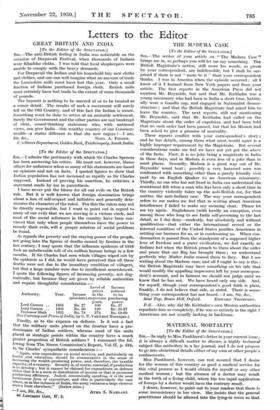THE MADURA CASE
[To the Editor of the SPECTATOR.] SIR,—The writer of your article on " The Madura Case" brings me in, so perhaps you will let me say something. The British Magistrate's action, still more his words, as given by your correspondent, are indefensible, but I shall be sur- prised if there is not " more to it " than your correspondent thinks. I was in America when the episode occurred ; all I know of it I learned from New York papers and from your article. The first reports in the American Press did not mention Mr. Reynolds, but said that Mr. Keithahn was a young missionary who had been in India a short time, habitu- ally wore a Gandhi cap, and engaged in Nationalist demon- strations ; and that the British Magistrate had asked him to leave the country. The next reports, still not mentioning Mr. Reynolds, said that Mr. Keithahn had called on the Magistrate about the 'order of expulsion, and had been told that no such order had been passed, but that his Mission had been asked to give a promise of neutrality.
These reports conflict with your correspondent's story ; and he has details, among them what most would agree is a highly improper requirement by the Magistrate. But several considerations make me feel we have not yet got the whole of the facts. First, it is no joke being a magistrate in India in these days, and in Madura is even less of a joke than in most places. Secondly, Madura is a great way out of Mr. Reynolds' usual beat ; possibly a very harassed man was confronted with something other than a purely friendly visit paid by an English Quaker to an American missionary. Thirdly, no one who has not lived in India can understand the resentment felt when a man who has been only a short time in the country violently takes up the anti-British (or, for that matter, the anti-Indian) case. The way your correspondent refers to me makes me feel that in writing about American interference I failed to make my meaning clear. Please let me try again. Englishmen (with hardly an exception, even among those who long to see India self-governing to the last detail, as I do) deny—modestly, but absolutely and without qualification—that either the international record or the internal condition of the United States justifies Americans in settling our business for us, or in condemning us. When con- demnation is passed from the standpoint of a supposed higher love of freedom and a purer civilisation, we feel exactly as Indians feel when the British preach to them about the brder and peace that our Raj has brought them ; we understand perfectly why Mother India roused them to fury. But I am writing about the Madura case, and all I ought to say is this ; the British Magistrate may have something on his side that would modify the appalling impression left by your correspon- dent's account, and in fairness we should not judge until we know that he has not. We have heard only one side. And, for myself, though your correspondent's good faith is plain, frankly, I do not believe that side, as stated. There is some- thing your correspondent has not heard.—I am, Sir, &c., Scar Top, Boars Hill, Oxford. EDWARD THOMPSON.
P.S.—Also, why did Mr. Keithahn's own Mission authorities repudiate him so completely, if he was so entirely in the right ? Americans are not usually lacking in backbone.


















































































 Previous page
Previous page